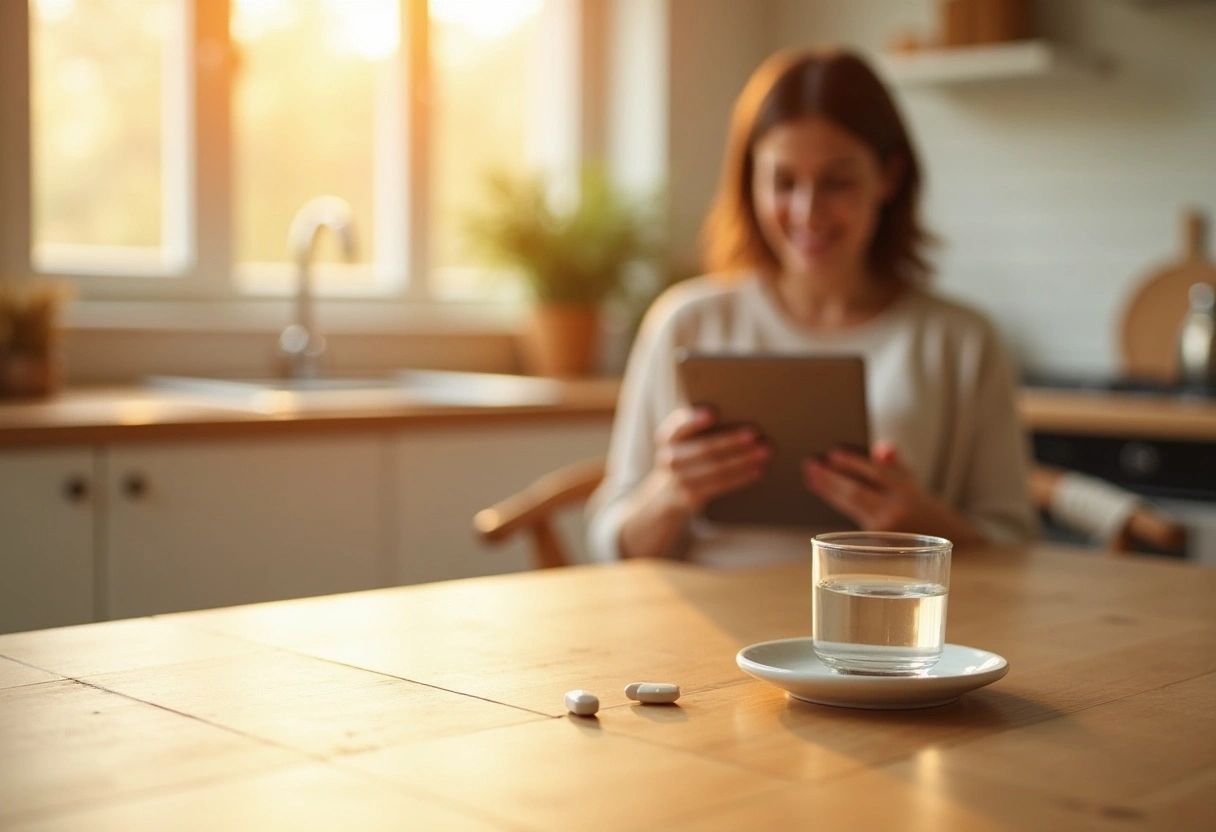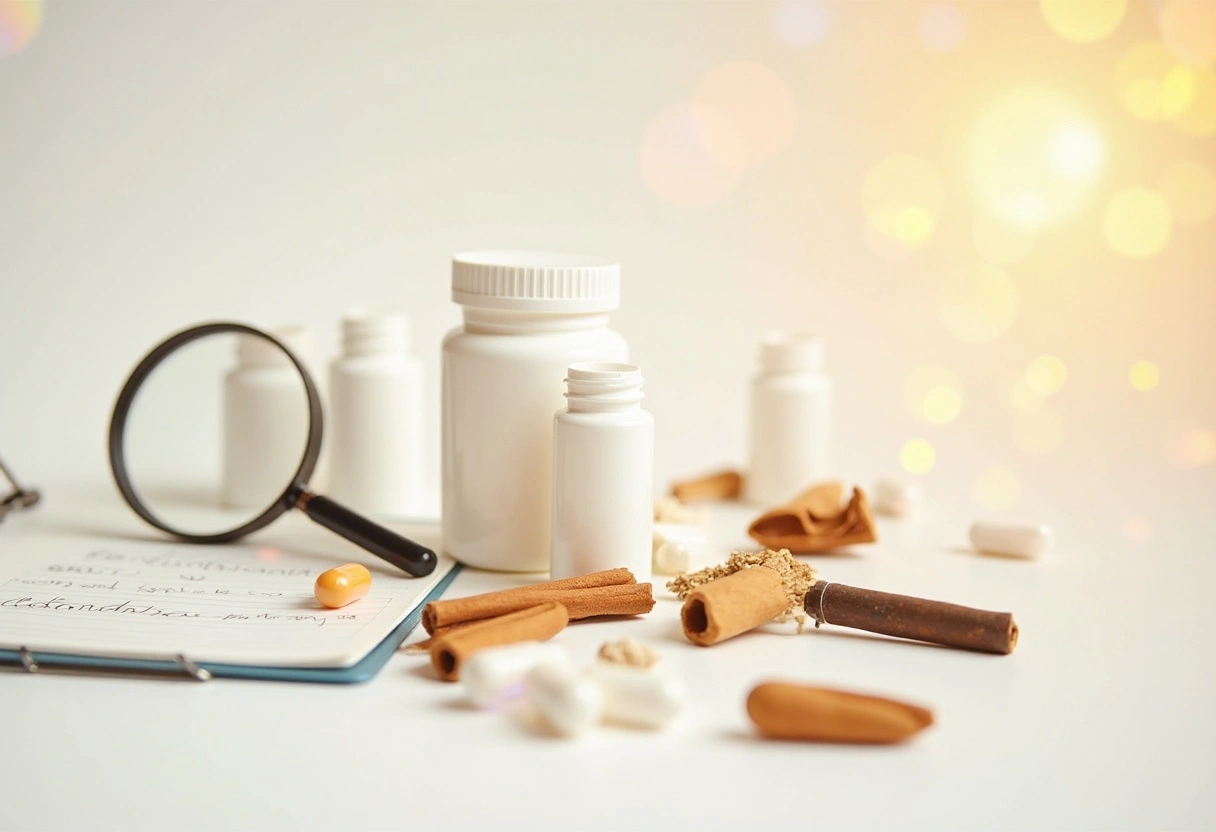Coffee and Semaglutide: What You Need to Know About Combining Caffeine with GLP-1 Medications
Curious about coffee while taking GLP-1 medications like Ozempic® or Wegovy®? Learn about potential digestive effects, safe caffeine limits, and expert tips from doctors on the Eden platform.
- There are no known harmful interactions between caffeine (like that found in coffee) and GLP-1 medications such as semaglutide.
- Up to 400 mg of caffeine per day (about 3–4 cups of coffee) is generally recognized as safe for most healthy adults.
- Some people may experience digestive discomfort or a temporary increase in heart rate when combining caffeine with GLP-1 treatments.
- Choosing low-calorie coffee options may better support your wellness goals while using prescription GLP-1 medications.
- Eden is a platform through which you may connect with licensed healthcare providers who may help review lifestyle factors—like caffeine use—as part of your personalized care plan based on your health assessment
Please note that this article is not meant to be medical advice; please consult with a licensed healthcare provider to determine best practices for your health.
Understanding Semaglutide
Understanding Semaglutide: What It Is and How It’s Used
Semaglutide is a type of GLP-1 receptor agonist—a class of prescription medications used in FDA-approved treatments for:
- Type 2 diabetes management (e.g., Ozempic®, Rybelsus®)
- Chronic weight management in individuals with obesity or overweight (e.g., Wegovy®)
These medications work by mimicking the effects of a naturally occurring hormone called GLP-1 (glucagon-like peptide-1), which plays a role in regulating blood sugar and digestion.
Semaglutide is believed to help support:
- Slower digestion of food in the stomach
- A reduced appetite or sense of early fullness
- More stable blood sugar levels after meals
These effects may vary depending on the individual, the dose, and the specific GLP-1 medication prescribed. Always follow guidance from a licensed healthcare provider when starting or adjusting any prescription treatment.
Eden does not manufacture semaglutide or provide medical care. Eden connects patients with licensed U.S. healthcare providers who can determine whether GLP-1 medication is appropriate and, if eligible, coordinate prescriptions through state-licensed compounding pharmacies.
Caffeine and Its Effects
Caffeine and Its Effects: What to Know Before You Sip
Caffeine is a natural stimulant found in coffee, tea, energy drinks, and some supplements. When consumed in moderation—generally up to 400 mg per day (about 3 to 4 cups of brewed coffee)—it is considered safe for most healthy adults.
Potential Benefits of Moderate Caffeine Intake May Include:
- Increased alertness and focus
- Improved mood or perceived energy
- A mild boost in physical or mental performance
Some research has linked regular caffeine consumption with a lower risk of certain chronic conditions, but responses to caffeine vary from person to person. Always consult a healthcare provider for guidance on caffeine use as part of a broader wellness plan.
Possible Side Effects of Too Much Caffeine May Include:
- Jitteriness, restlessness, or increased anxiety
- Upset stomach or acid reflux
- Difficulty sleeping, especially if consumed later in the day
- Mild dehydration if fluid intake is otherwise low
If you're currently using a GLP-1 medication like semaglutide, it's helpful to be mindful of how caffeine affects your digestion and energy levels. In some cases, overlapping side effects—such as nausea or an elevated heart rate—may be more noticeable when caffeine and medication are taken around the same time.
{{primary-cta}}
Can You Drink Coffee While Taking Semaglutide?
Yes—there are no known harmful interactions between caffeine (like that found in coffee) and GLP-1 medications such as semaglutide. However, both substances can affect digestion and heart rate, which means some individuals may experience overlapping side effects, especially during the early stages of treatment.
Caffeine and semaglutide don’t interact directly in the body, but their combined effects on the gastrointestinal system and energy levels can make certain symptoms more noticeable.
Shared Side Effects: Comparison Table
Even without direct interactions, overlapping side effects like nausea or jitteriness may become more noticeable when caffeine is consumed around the same time as semaglutide. Individual tolerance levels vary, so monitoring how your body responds is essential.
How to Enjoy Coffee Safely While Taking Semaglutide
How to Enjoy Coffee Safely While Taking Semaglutide
If you're taking a GLP-1 medication like semaglutide—whether for type 2 diabetes or weight management—being intentional about your caffeine habits can help minimize side effects and support your overall wellness.
Here are practical tips that may help coffee drinkers using GLP-1 medications:
Start Low and Go Slow
Begin with 1–2 cups of coffee per day, especially if you’re just starting semaglutide. This can help reduce the risk of nausea or other digestive discomfort.
Time It Right
Try waiting 30 to 60 minutes after your GLP-1 injection before drinking coffee. Giving your body time to process the medication may reduce overlapping side effects like stomach upset.
Watch the Add-Ins
Many popular coffee drinks are high in added sugars and calories, which may work against your health goals. Stick to black coffee or low-calorie alternatives.
Hydrate More Than Usual
Caffeine and semaglutide can both contribute to dehydration. Aim for 2.5 to 3 liters of water per day, or more if you’re physically active or experiencing side effects like vomiting.
Pay Attention to How You Feel
Track how your body responds to caffeine—look for signs like bloating, increased jitteriness, or changes in appetite. Everyone’s tolerance is different.
If you notice persistent or worsening symptoms, consider discussing your routine with a licensed healthcare provider. Eden can help you connect with a provider to explore possible adjustments to your treatment or daily habits.
{{primary-cta}}
Adjusting Your Caffeine Routine on GLP-1 Medications
What to Do If Coffee Isn’t Sitting Well While Taking Semaglutide
If you're feeling nauseous, jittery, or off-balance after having coffee while taking a GLP-1 medication like semaglutide, you’re not alone. Some people may find that their usual caffeine routine needs tweaking while their body adjusts to treatment.
Rather than cutting caffeine out entirely, you might consider lighter or non-caffeinated alternatives that still offer comfort, energy, or focus—without the added side effects.
Gentler Alternatives to Coffee
Here are some great options for those experiencing caffeine sensitivity:
- Decaf Coffee: Familiar flavor, minimal caffeine
- Green Tea: Milder stimulant effect and contains L-theanine, which may promote calm alertness
- Herbal Teas: Peppermint, ginger, or chamomile teas can support digestion and relaxation
- Warm Lemon Water: A comforting, caffeine-free morning ritual that supports hydration
- Chicory Root Coffee: A naturally caffeine-free option with a rich, coffee-like taste
- Protein Smoothies: Can help maintain energy and satiety—especially when blended with fiber, greens, or healthy fats
Everyone responds differently to GLP-1 medications and to caffeine. If you're still unsure how to adjust, Eden connects you to licensed healthcare providers who may help you fine-tune your habits as part of your treatment journey.
Final Thoughts
Combining moderate coffee intake with a GLP-1 prescription like semaglutide is generally safe, but tuning into your body is key. Remember:
- Watch for Overlapping Side Effects: Nausea, jitteriness, or mild digestive changes can pop up if caffeine and medication effects align too closely.
- Choose Low-Sugar, Low-Calorie Options: Black coffee, half-caff, or herbal infusions can satisfy cravings without derailing your goals.
- Stay Hydrated: Aim for at least 2.5–3 liters of water daily to offset any dehydrating effects of caffeine or medication.
If you ever feel unsure about your routine—or if persistent symptoms arise—Eden can connect you with licensed healthcare providers who can review your lifestyle habits and medication plan. Schedule a consultation today to tailor your metabolic strategy to your unique treatment journey.
Start your consultation with licensed healthcare providers: connect via Eden platform
This content is for informational purposes only and is not intended as medical advice. Eden does not provide medical care, prescribe medication, or manufacture pharmaceutical products. Eden connects individuals with licensed healthcare providers who determine treatment eligibility and coordinate prescriptions through state-licensed pharmacies, when appropriate. Always consult with a qualified healthcare professional before starting, stopping, or combining any medications or supplements, including GLP-1 treatments like semaglutide. Individual results and side effects may vary.
Disclaimer: The FDA does not approve compounded medications for safety, quality, or manufacturing. Prescriptions and a medical evaluation are required for certain products. The information provided on this blog is for general informational purposes only. It is not intended as a substitute for professional advice from a qualified healthcare professional and should not be relied upon as personal health advice. The information contained in this blog is not meant to diagnose, treat, cure, or prevent any disease. Readers are advised to consult with a qualified healthcare professional for any medical concerns, including side effects. Use of this blog's information is at your own risk. The blog owner is not responsible for any adverse effects or consequences resulting from the use of any suggestions or information provided in this blog.
Eden is not a medical provider. Eden connects individuals with independent licensed healthcare providers who independently evaluate each patient to determine whether a prescription treatment program is appropriate. All prescriptions are written at the sole discretion of the licensed provider. Medications are filled by state-licensed pharmacies. Please consult a licensed healthcare provider before making any medical decisions.
Frequently asked questions
It’s often best to wait 30–60 minutes after your injection or oral dose. This simple timing tweak can reduce the chance of nausea or stomach upset.
No known interaction impacts drug effectiveness. However, overlapping side effects—like digestive discomfort—may feel more pronounced when caffeine and semaglutide are close together.
Yes. Unsweetened coffee avoids extra sugars and calories, which may support your health goals if you're using a GLP-1 medication.
Up to 400 mg of caffeine per day (around 3–4 cups of brewed coffee) is generally safe for most adults. Individual tolerance varies—listen to your body.
Try lighter options like half-caff, decaf, green tea, or soothing herbal teas (peppermint, ginger). If symptoms persist, Eden can connect you with a provider to adjust your plan.
Blog Components



References
The wellness insight you need, without the noise.




















